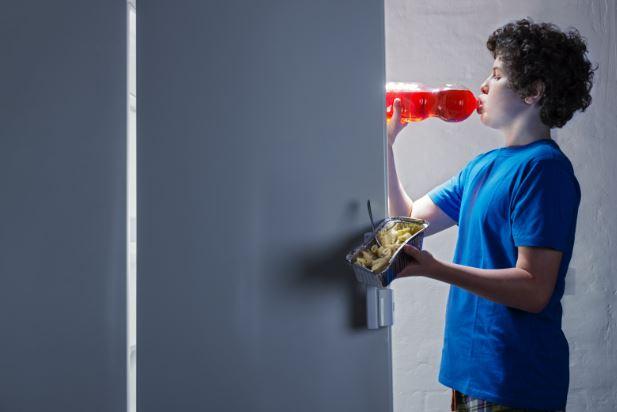Have you noticed your child turning to food in times of emotional distress? Do they seem to reward themselves with food or use food as an escape? Using food as a relief from stress is known as “stress eating” and can lead to childhood obesity and a host of related health problems throughout life. Learn the signs of unhealthy stress eating and some strategies for helping your child stop this destructive habit.
Signs of Stress Eating
Your child may be stress eating if you notice them eating a lot between meals when they aren’t really hungry, raiding the refrigerator at odd times of day, hiding or sneaking food, reaching for food before or after a stressful situation, showing a very strong urge to eat or turning to food when their mood is out of balance. Stress eating often involves sugary or fatty foods, which have a drug-like effect on the body, quickly producing a sense of comfort or euphoria. Breaking the habit of using food for emotional comfort can be as difficult as kicking a drug habit — for similar physical reasons.
Reduce Stress
The obvious first step to counteracting this unhealthy eating pattern is to reduce the emotional triggers. If your child is suffering from anxiety, consider using Brillia, a safe homeopathic over-the-counter product formulated to help reduce anxiety. Stress can also come from exhaustion, so implementing a regular bedtime and aiming for a healthy 10 hours of sleep per night can also make a huge difference. Other potential sources of stress in your child’s life could be bullying, school, divorced parents or a new sibling. Some sources may possible to eliminate, but with unavoidable difficulties, it can be helpful to have regular, honest conversations with your child about the emotions they are experiencing.
Reduce Sedentary Time
An obvious negative effect of stress eating is gaining too much weight. This can have serious health consequences for children, including heart disease, diabetes, breathing problems, and joint problems. And ironically, a child who eats because of anxiety may end up experiencing more anxiety and depression because of unwanted weight gain. In addition to changing eating habits, your child can combat unhealthy weight gain by reducing the time spent in sedentary activities, such as watching TV, video gaming or looking at a tablet or smartphone. To provide a counterbalance to screen time, engage your kid in physical activities. Sports are great for many kids, but even those who are not interested in organized athletics can enjoy hiking or jogging with a family member, gardening, jumping on a trampoline, walking the dog or participating in dance or yoga classes. Get them moving every day!
Make a Food Plan
Stress eating is often unconscious behavior, meaning it goes on without your child even noticing it. Did you ever sit down in front of the TV with a large bag of chips and “wake up” later to realize you ate the whole thing? Did you ever answer the phone while holding a pint of ice cream and hang up half an hour later with an empty container in your hand? Your child’s stress eating may also happen without them really noticing the amounts they have consumed. Help them make a food plan and stick to it. Three nutritious meals each day, with an afternoon snack, will help them feel full and satisfied without slipping into grazing mode and consuming unhealthy quantities. Remember to include protein, healthy fats and fresh fruit or vegetables in each meal. Don’t bring high-sugar snacks into the house at all! They’re not good for your child or for you. Instead provide string cheese, fresh fruit, yogurt, veggies with sour cream, jerky or roasted nuts for healthful snacks that will provide energy without inducing compulsive overeating.
Change Attitudes at Home
Studies indicate that “emotional eating” is largely a result of factors in the child’s environment, rather than genetics. This suggests that changing the family’s culture around food can help change a child’s unhealthy eating habits. Try to view food as fuel for physical and mental activity rather than as an escape, a reward or an indulgence. Make each meal delicious and an opportunity for gathering together as a family. Avoid solitary snacking as a replacement for regular meals. Don’t overuse food as a reward. Try replacing the post-game or post-test ice cream cone with a fun outing or small gift and remember that sincere words of praise may be the best reward of all. If you can change your own attitude to food, your child will almost certainly follow your example and experience the benefits of good nutrition, enjoyable mealtimes and healthy physical activity.


 Improve focus and clarity.
Improve focus and clarity.

